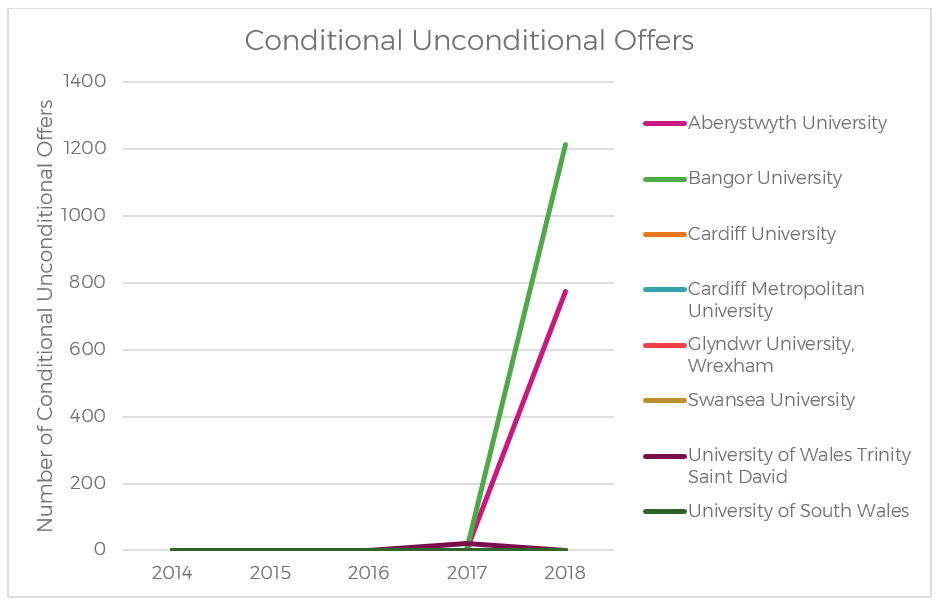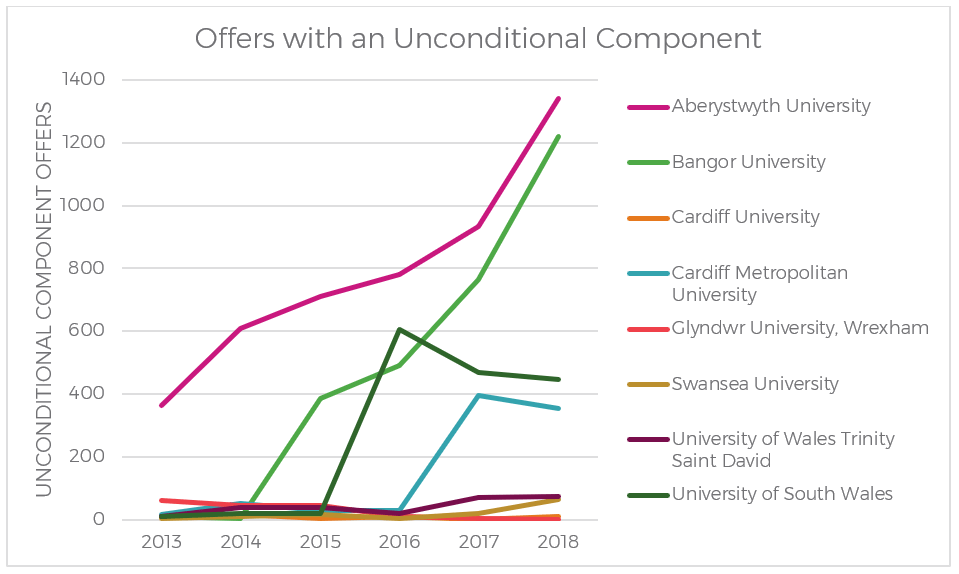Introduction
On 31 January UCAS published its data on applications and acceptances made through its ‘Main Scheme’ for the current 2018/19 academic year.
The UCAS main scheme allows prospective students to apply to up to five providers/courses. Other than for Scottish students, it is the main route for the overwhelming majority of UK full-time undergraduate students into university. UCAS also administer their ‘Clearing System’ which is separate from their Main Scheme.
This blog post briefly explores the headlines from this new UCAS university level data.
The need to interpret this data carefully
Not all students apply to university via UCAS.
This means that whilst this data can offer insight into the demand from full-time undergraduates, it cannot give the complete recruitment picture.
The data for example does not include large numbers of EU and international students, and all postgraduate and research students who apply outside the UCAS schemes.
How many applications were made to study at a Welsh university?
Table 01 – Applications to Welsh universities (through the main scheme, not clearing)
The table shows that for this academic year, all universities except the University of Wales Trinity Saint David saw a reduction in the number of Main Scheme applications. The reductions ranged from 3 per cent for Aberystwyth University, to 10 per cent for Swansea University.
Relevant factors for this reduction may include the continued demographic dip, higher entry standards, and the changing behaviour of prospective students who may now actively seek an offer through the Clearing System.
How many students accepted an offer to study at a Welsh university?
Table 02 – Applicants who accepted an offer from a Welsh university (including Clearing)
This table shows all applicants who accepted an offer from a Welsh university.
It therefore looks at individuals and not applications, giving a better picture of full-time undergraduate demand.
It can be seen that for this academic year all universities except Cardiff University have seen a reduction in acceptances, although changes in absolute terms were sometimes relatively small.
The percentage reductions ranged from 3 per cent at Bangor University, to 12 and 13 per cent respectively at Aberystwyth University and Swansea University.
However, what this table cannot show are the recruitment targets of each university.
Recruitment targets are closely linked to a university’s budget for the academic year. This means, for example, that if a provider was planning to recruit fewer students as part of a managed consolidation (like for example, London Metropolitan University), then any reduction in recruitment this year will have no unplanned impact.
This table should be considered alongside the strategies and plans of each institution.
How many unconditional offers were made by Welsh universities?
There has been considerable media interest in unconditional offer making, with the former English Minister for universities Sam Giymah arguing that a recent rise in their use was ‘completely irresponsible’.
Why do universities make unconditional offers?
Where available, UCAS have published statements from Welsh universities regarding their positions on unconditional offers.
In general, universities make unconditional offers for a variety of reasons which include the applicant’s grades being known (as in Scotland) and from assessing applicants for entry via interviews, portfolio’s, work-experience or on another basis.
A number of providers do this via ‘contextualised admissions’ where admittance may not rely on academic prior attainment – the institution uses other ways of judging if a candidate will thrive at university. Many universities have unconditional offer policies and strategies.
However, aspects of unconditional offer-making remain controversial with some arguing that the practice is being driven by commercial concerns and is not in the interests of students.
The ‘conditional unconditional’ offer
Of particular interest have been what UCAS define as ‘conditional unconditional’ offers.
This is where a university makes an unconditional offer to a student – on condition that the student confirms the university as their first UCAS choice.
The English Office for Students argues that such offers may represent ‘pressure selling’ under consumer law and in practice and although there is no consensus on this, their use remains controversial by some.
Two out of the eight Welsh universities are recorded by UCAS as having made these types of unconditional offer, namely Bangor University and Aberystwyth University who both did so for the first time this year.
Figure 01 – Trend in conditional unconditional offers
The number of all types of unconditional offer made by Welsh universities
Table 03 – Offers made by Welsh universities which had an unconditional offer component
UCAS use the technical term, ‘offers with an unconditional component’. This simply means offers which were at some point, unconditional.
The table shows that some Welsh universities such as Cardiff and Glyndwr have traditionally made much less use of unconditional offers of any type, whereas other providers have made increasing use of them, as shown by the trend chart below.
Figure 02 – Offers with an unconditional component – trend 2013 - 2018
Conclusion
Whilst this data must be interpreted with care, as stated by UCAS it provides broad early indications as to the demand for places at Welsh universities and within Wales as whole amongst most full-time undergraduates.
It also shows a change in offer-making by two Welsh universities this year, with ‘conditional unconditional’ offers increasing from zero in previous years, to between 19 and 29 per cent of their total offers this year.
Article by Phil Boshier, National Assembly for Wales Research Service











